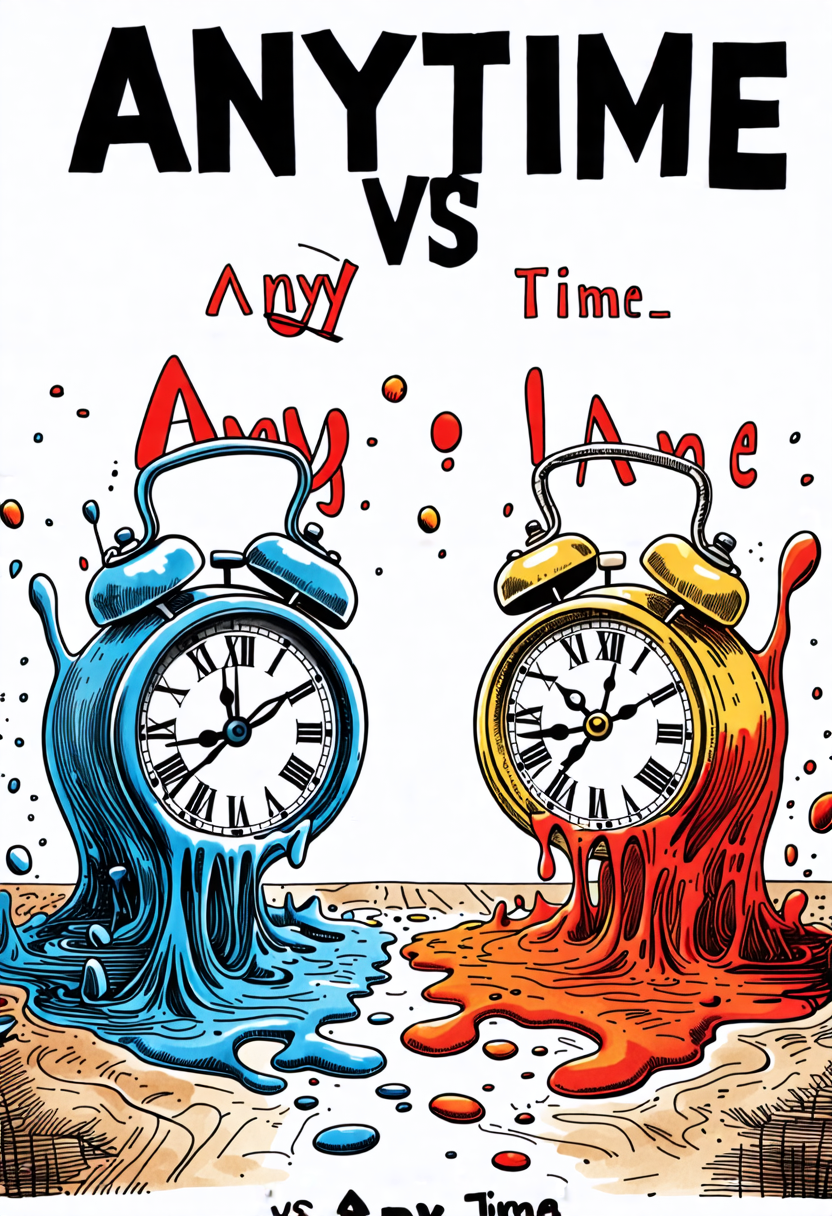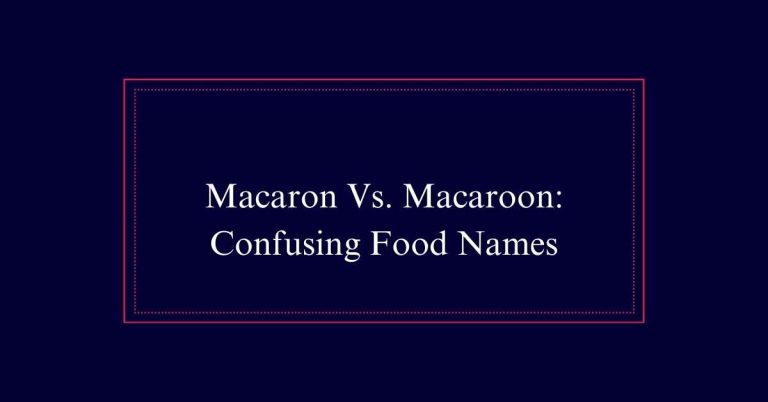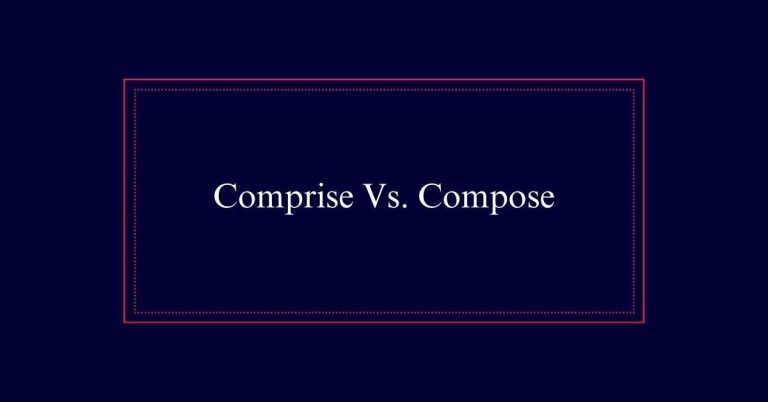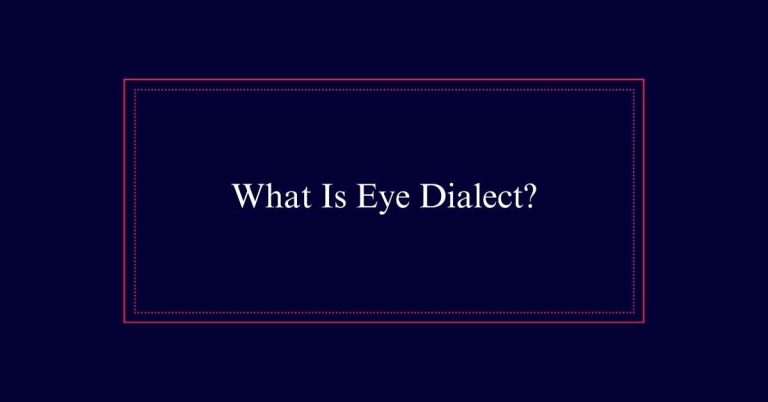Anytime Vs. Any Time
The difference between “anytime” and “any time” lies in their usage and importance. “Anytime” is an adverb meaning “whenever” and is used in informal contexts. It cannot be used with prepositions. In contrast, “any time” refers to an unspecified amount or portion of time and is often used in more formal writing.
Defining ‘Any Time’
Any time, written as two words, refers to an unspecified amount of time. It is used when discussing an amount of time rather than a specific moment.
For example, you might ask, ‘Do you have any time to discuss this project?’ In this situation, ‘any time’ is correct because it refers to a quantity of time available. It is important to use ‘any time’ when pairing it with prepositions like ‘at,’ as in ‘at any time.’ Using the correct terminology guarantees clarity and prevents misinterpretation.
Defining ‘Anytime’
‘Anytime’ is an adverb that means whenever or at any time. It is used to indicate that an action can occur at any unspecified point.
Unlike ‘any time,’ ‘anytime’ is a single word and serves a specific grammatical function.
To clarify its usage:
- Interchangeability: Substitute ‘anytime’ with another adverb like ‘quickly’ to check its correctness.
- Formality: Using ‘anytime’ as one word may appear old-fashioned or formal, but it is still correct.
- Restrictions: ‘Anytime’ cannot be used with prepositions, unlike ‘any time’.
Adverb Usage of ‘Anytime’
The word ‘anytime’ serves as an adverb indicating that an action can happen at any unspecified moment.
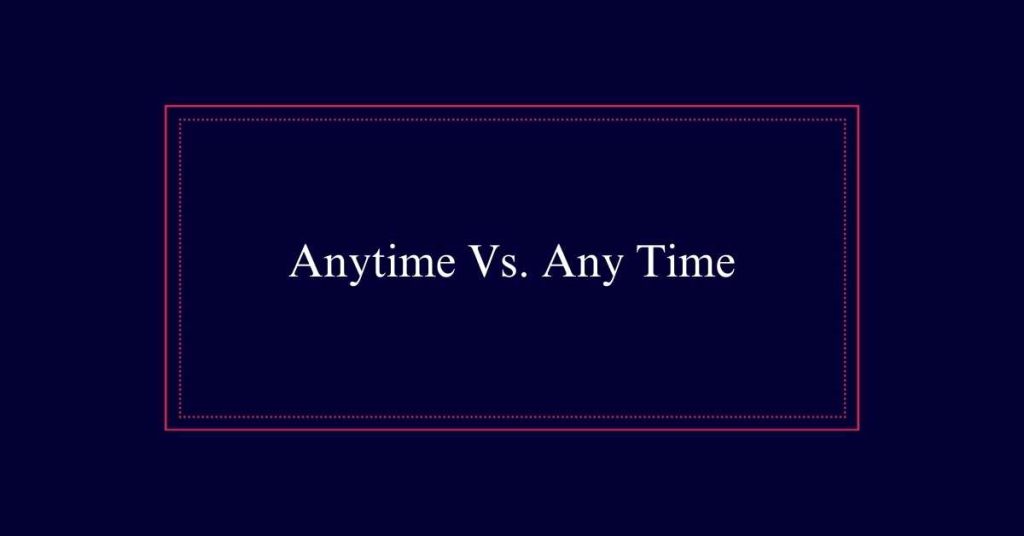
For instance, in the sentence ‘You can call me anytime,’ it means the call can occur at any moment without a specific time frame.
This usage is straightforward and flexible, making it ideal for informal contexts.
Additionally, ‘anytime’ can replace other adverbs such as ‘whenever’ or ‘at any time,’ maintaining the same meaning.
It’s essential to note that ‘anytime’ should not be used with prepositions, as this changes its function.
Prepositional Rules for ‘Any Time’
When using the phrase ‘any time’ with a preposition, it is essential to keep it as two separate words. This rule is crucial for maintaining grammatical accuracy. Incorrect usage can lead to confusion and a lack of clarity.
For instance:
- With prepositions: ‘Please call me at any time.’
- Without prepositions: ‘You can visit anytime.’
- Incorrect example: ‘Please call me at anytime.’
Amount of Time Contexts
Using ‘any time’ as two words is also vital when referring to an amount of time. This usage is essential when you need to specify a measurable period. For example, you would say, ‘Do you have any time to discuss this project?’ Here, ‘any time’ indicates a specific portion of time that can be allocated. Using ‘anytime’ in this situation would be incorrect.
It’s important to distinguish between the adverbial ‘anytime’ and the noun phrase ‘any time’. This distinction helps in clearly conveying your message and maintaining grammatical accuracy. Remember, ‘any time’ fits well when you can replace it with ‘some time’ or ‘a specific time’ without changing the sentence’s meaning.
Formality and Style Choices
Formality and style choices influence whether to use ‘anytime’ or ‘any time’ in your writing. The decision often depends on the context and tone you wish to convey. Here are three key considerations:
- Formality:
‘Any time’ is more formal and appropriate for professional or academic writing.
- Tone:
‘Anytime’ is more casual and suitable for informal communication.
- Consistency:
Maintaining a consistent style enhances readability and professionalism.
In formal documents, ‘any time’ ensures clarity and precision. For a relaxed tone, ‘anytime’ as one word works well.
Common Mistakes With Examples
Understanding the formality and tone of your writing is important, but it’s also essential to avoid common mistakes with ‘any time’ and ‘anytime’. Misusing these terms can change the meaning of your sentence and confuse readers. Here are some common mistakes with examples:
| Incorrect Usage | Correct Usage | Explanation |
|---|---|---|
| Do you have anytime to talk? | Do you have any time to talk? | ‘Any time’ refers to an amount of time. |
| I can meet you at anytime. | I can meet you at any time. | ‘Any time’ must be two words with a preposition. |
| You can call me anytime. | You can call me anytime. | ‘Anytime’ is correctly used as an adverb. |
